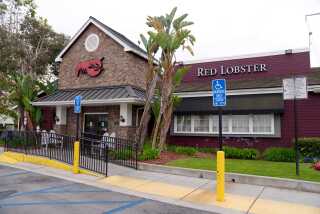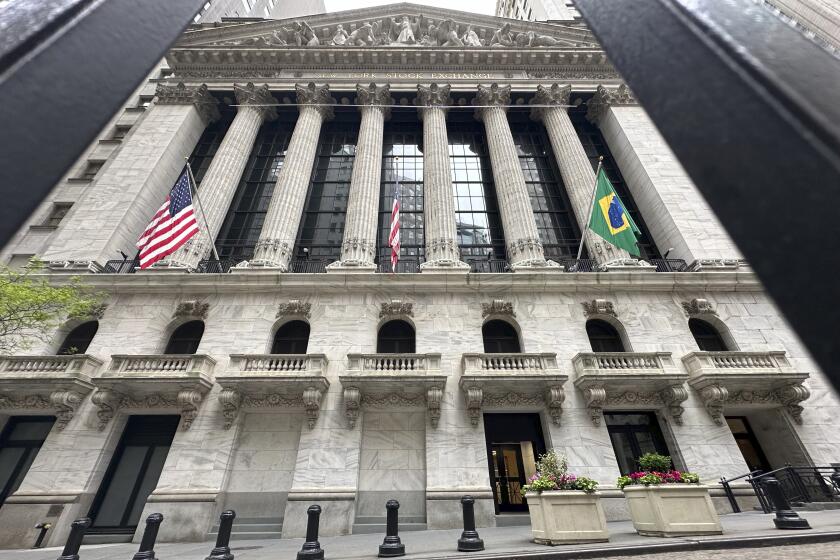1-Year-Old Stock Rally Shows Strain
Wall Street’s latest bull run began one year ago this week -- but whether it will celebrate a second birthday is a matter of growing debate.
All major stock market indexes tumbled Wednesday amid news of a record $43.1-billion trade deficit in January. Analysts, however, said the trade data were just the latest sign of an economy struggling to stay at cruising speed.
“At some point, the market had to come to grips with the fact that growth was slowing,” said John Caldwell, chief investment strategist at McDonald Financial Group in Cleveland. “The market may be indicating that economic strength may not be strong enough to sustain stock prices at these levels.”
The Dow Jones industrial average slumped 160.07 points, or 1.5%, to 10,296.89. It was the Dow’s biggest percentage loss since Oct. 22.
The broader Standard & Poor’s 500 index was off 16.69 points, or 1.5%, at 1,123.89.
The market had started 2004 with a strong rally, continuing the surge that began one year ago Friday, just as the U.S. was launching the war in Iraq.
But many investors’ gains since Jan. 1 have been pared or even wiped out in recent weeks by a slow-motion sell-off. The slide has been led by technology stocks, which were last year’s big market winners.
The tech-dominated Nasdaq composite index, which dropped 31.01 points, or 1.6%, to 1,964.15 on Wednesday, has fallen 8.8% since reaching a 32-month high Jan. 26 -- a much sharper decline than those experienced by blue-chip indexes.
“The stock market is the biggest consumer confidence poll of all,” said Hugh Johnson, chief investment strategist at First Albany Cos. in New York. “Investor confidence has been declining, and the reasons are pretty simple. The first is that investors collectively believe that forecasts for the economy for 2004 are too optimistic,” which could mean that expectations for corporate earnings, too, are overstated.
The January trade report showed that U.S. exports dropped 1.2% from December. The decline stemmed in part from lower demand for U.S. food exports after mad cow disease was discovered in Washington state late last year.
Some analysts said the lack of export growth compounded economic worries that surfaced Friday, when government data showed that February job growth was far below forecasts.
The weak employment report helped fuel a new rally in bonds as more investors bet that the economy would not be robust enough this year to push interest rates higher. Long-term Treasury bond yields have fallen to eight-month lows in recent days. Yields were little changed Wednesday.
Normally, falling rates would help stocks. But in this go-round, economic jitters are giving pause to some would-be investors.
Still, analysts say the market’s weakness might signal nothing more than a “correction” within a bull market -- meaning a temporary pullback of 10% to 15% in key indexes.
“We have had a market that’s moved consistently higher since March of last year, without really any significant pullbacks,” said Stuart Freeman, chief equity strategist at A.G. Edwards Inc. in St. Louis. “We are getting into the middle of the [economic] expansion. As you get there, it’s not unusual to see the flavor of the stocks that the market is attracted to changing a little bit.”
“You just can’t have 40% back-to-back increases in stocks year after year,” he added.
Since March 11, 2003, the Dow has risen 36.9%. The S&P; 500 has posted a gain of 40.4%, and the Nasdaq composite has soared 54.5%.
While many technology and heavy-industry stocks have lost ground in recent weeks, investors have been favoring stocks in such sectors as energy, consumer products, healthcare and restaurants.
“Investors are playing it safer and safer,” looking for firms that might have an easier time generating profit growth if the economy slows, Johnson said.
Wall Street optimists say that, even if some stock sectors fall out of favor, the market overall could continue to advance if investors keep faith that the economy will remain on a growth track.
“We wouldn’t be surprised to see the market a little higher at the end of the year because economic growth is going to be a little higher than normal,” if below the sunniest forecasts, McDonald’s Caldwell said. “We have been talking about 6% to 8% returns for the year.”
Among Wednesday’s highlights:
* Three stocks fell for every one that rose on the Big Board, in heavy trading.
* Losers in the tech sector included IBM, down $1.47 to $93.06; Intel, down 67 cents to $27.31; and InfoSpace, down $2.30 to $31.76.
* Among heavy-industry shares, Alcoa slid $1.45 to $34.20; Caterpillar fell $2.89 to $73.51.
* Procter & Gamble, the nation’s biggest household goods company and the highest-priced stock on the Dow, single-handedly helped Wednesday’s losses from being even worse. Its shares rose $3.04 to $105.53, thanks to better-than-expected earnings. The firm also plans to hike its quarterly dividend by 10% and split its stock 2-for-1.
Other consumer-product stocks attracting buyers included Hershey Foods, up $1.45 to $85.45, and Avon Products, up $1.84 to $73.59.






